On October 30…
“Without laughter, life on our planet would be intolerable. So important is laughter to us that humanity highly rewards members of one of the most unusual professions on earth – those who make a living by inducing laughter in others.”
~Steve Allen
==========================

==========================
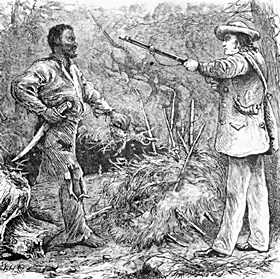
1831 – Nat Turner was arrested for leading the bloodiest slave rebellion in United States history.
The insurrection took place in Southampton County, Virginia in August 1831. Rebel slaves killed from 55 to 65 people, at least 51 being white.
Within a day of the suppression of the rebellion, the local militia and three companies of artillery were joined by detachments of men from the USS Natchez and USS Warren, which were anchored in Norfolk, and militias from counties in Virginia and North Carolina.
The state executed 56 black people and militias killed at least 100 more.
Turner eluded capture for six weeks. On October 30, a farmer named Benjamin Phipps discovered him hidden in a depression in the earth, created by a large, fallen tree that was covered with fence rails.
He was tried on November 5 for “conspiring to rebel and making insurrection.” He was convicted and hanged on November 11 in Jerusalem, Virginia.
Idle Thought: Arrested, tried, convicted and executed all within 13 days. “Justice” was certainly a speedy process back then.
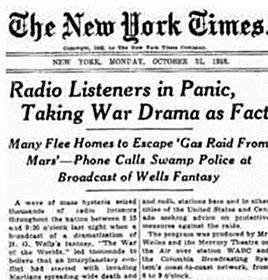
1938 – Orson Welles aired his radio play of H. G. Wells’ The War of The Worlds, causing anxiety in some of the audience in the United States.
It was performed and broadcast live as a Halloween episode at 8 p.m. over the Columbia Broadcasting System radio network as part of the American radio drama anthology series The Mercury Theatre on The Air.
Some listeners heard only a portion of the broadcast and, in the tension and anxiety prior to World War II, mistook it for a genuine news broadcast.
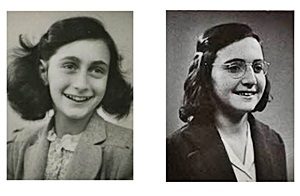
1944 – Anne Frank and her older sister Margot were deported from Auschwitz to the Bergen-Belsen concentration camp.
Margot died sometime in February 1945 at the age of 19 due to typhus. A few days later, Anne died at the age of 15 due to the same illness.
The sisters were buried in a mass grave at an unknown location.
According to Anne’s diary, Margot kept a diary of her own, but no trace of hers has ever been found.
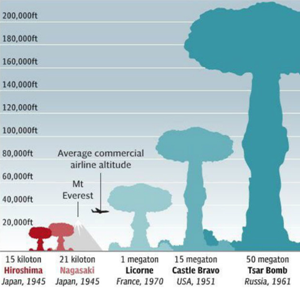
1961 – A little more than 16 years after humanity entered the age of nuclear warfare, the Soviet Union demonstrated the frightening capabilities of their nuclear arsenal by detonating an almost inconceivably powerful hydrogen bomb.
The Tsar Bomba produced the most powerful artificial explosion in history, yielding about 50 megatons (50 million tons) of TNT.
In theory, the bomb would have had a yield in excess of 100 Megatons if it had included a uranium-238 tamper, but because only one bomb was built, that capability has never been tested.
The 5-mile wide fireball reached nearly as high as the altitude of the plane that released it and was visible 620 miles away.
The mushroom cloud was 42 miles high … over seven times the height of Mount Everest.
Our Bomb Is Bigger Than Your Bomb Factoid: The magnitude of the Soviet bomb dwarfed Castle Bravo, the most powerful nuclear device ever detonated by the United States. Detonated on March 1, 1954, that device yielded 15 megatons of TNT.
Megaton Factoid: To give you an idea of the enormity of the Tsar Bomba, the Little Boy dropped on Hiroshima yielded 15 kilotons, while Fat Man, dropped on Nagasaki, yielded 21 kilotons.
The atomic bombs dropped by the U.S. were able to disintegrate an entire city – as Hiroshima and Nagasaki were – but the Tsar Bomba was virtually capable of destroying an entire small country.
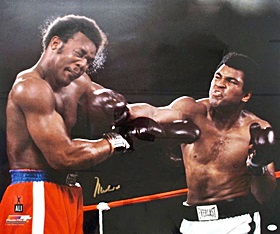
1974 – Muhammad Ali knocked out previously undefeated champion George Foreman in the eighth round of a 15-round bout in Kinshasa, Zaire, to regain his world heavyweight title.
The “Rumble in the Jungle” was watched by a record estimated television audience of 1 billion viewers worldwide, including an estimated 50 million viewers watching the fight on a pay-per-view basis on closed-circuit theatre TV.
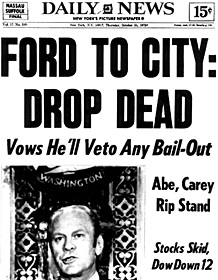
1975 – The New York Daily News published a controversial – and misleading – headline.
The paper’s headline “Ford to City: Drop Dead” ran a day after President Gerald R. Ford said he would veto any proposed federal bailout of New York City.
In a speech before the National Press Club, the president had said, “The people of this country will not be stampeded. They will not panic when a few desperate New York officials and bankers try to scare New York’s mortgage payments out of them.”
Ford never explicitly said “drop dead,” yet those two words, arguably the essence of his remarks would, as he later acknowledged, cost him the presidency the following year, after Jimmy Carter, nominated by the Democrats in New York, narrowly carried the state.
“It more than annoyed me because it wasn’t accurate,” Ford recalled years later. “It was very unfair.”

2000 – Steve Allen died following a minor car accident. He was 78.
It was first suspected he had suffered a fatal heart attack while napping at his son’s Los Angeles area home.
However, a Los Angeles Coroner’s spokesperson later said autopsy results showed the real cause of death was a ruptured blood vessel caused by chest injuries he did not realize he had sustained in a minor traffic accident earlier in the day.
While most will remember him as a comedian and the first host of The Tonight Show – the first late night television talk show, Allen was much more than that.
He was a renowned pianist and a prolific composer. By his own estimate, he wrote more than 8,500 songs, and as a lyricist, Allen won the 1964 Grammy Award for Best Original Jazz Composition.
He also wrote more than 50 books, including novels, children’s books, and books of opinions.
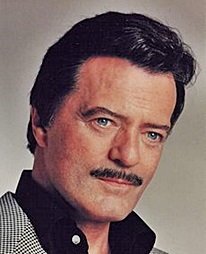
2007 – Robert Goulet died from pulmonary fibrosis at the age of 73.
Cast as Sir Lancelot and originating the role in the 1960 Broadway musical Camelot starring opposite established Broadway stars Richard Burton and Julie Andrews, he achieved instant recognition with his performance.
It marked the beginning of a stage, screen, and recording career that spanned almost six decades.
A Grammy, Tony and Emmy winner, he was one of the greatest baritones of a generation.
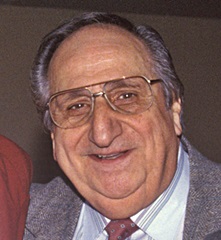
2015 – Actor Al Molinaro died of complications from an infected gallbladder at the age of 96.
He was best known for his television sitcom roles as Al Delvecchio on Happy Days and Officer Murray Greshler on The Odd Couple.
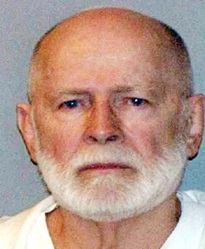
2018 – Boston mob boss James “Whitey” Bulger was killed in prison at the Penitentiary Hazelton in Bruceton Mills, West Virginia.
The 89-year-old Bulger was serving two terms of life imprisonment after being convicted of 31 counts of racketeering and firearms possession. The racketeering counts included allegations that Bulger was complicit in 19 murders.
Prison cameras caught at least two inmates rolling Bulger, who was in a wheelchair, into the corner where he was beaten to death with a sock-wrapped padlock and a shiv.
Compiled by Ray Lemire ©2019 RayLemire.com / Streamingoldies.com. All Rights Reserved.
